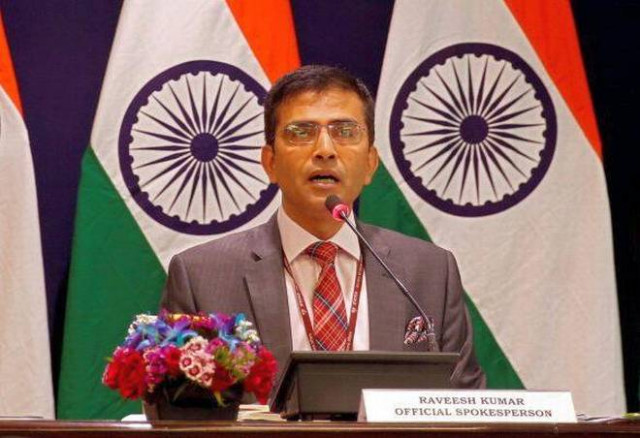New Delhi calls for end to CPEC-related activities in Azad Kashmir
India miffed over reference to occupied Kashmir in Pak-China joint statement

Released on Sunday after Chinese State Councilor and Foreign Minister Wang Yi's September 7-8 visit to Islamabad, the joint statement conveyed Beijing's opposition to "unilateral actions that complicate the situation" in the disputed Kashmir region.
Ministry of External Affairs (MEA): We reject the reference to Jammu & Kashmir in the Joint Statement issued by China and Pakistan after the recent visit of Chinese Foreign Minister. Jammu & Kashmir is an integral part of India. pic.twitter.com/29jFRqGkc5
— ANI (@ANI) September 10, 2019
On Tuesday, India's Ministry of External Affairs Spokesperson Raveesh Kumar said New Delhi rejects the reference to IOK and continues to oppose China-Pakistan Economic Corridor (CPEC) activities in Azad Jammu and Kashmir (AJK).
“We reject the reference to Jammu and Kashmir in the joint statement issued by China and Pakistan after the recent visit of Chinese Foreign Minister. J&K is an integral part of India,” he said.
He said New Delhi has "consistently expressed concerns to both China and Pakistan" on CPEC projects in AJK, which he claimed were on "territory of India that has been illegally occupied by Pakistan since 1947".
Kumar added that India is "resolutely opposed to any actions by other countries to change the status quo" in AJK. "We call on the parties concerned to cease such actions," said the spokesperson.
Pakistan, 50 countries demand action to end Kashmir humanitarian crisis
In the Pak-China joint statement, Beijing had reaffirmed its support for Islamabad's efforts towards "safeguarding its sovereignty, territorial integrity, independence and national dignity".
On Kashmir, China said it was paying close attention to the current situation and reiterated that the issue "is a dispute left from history, and should be properly and peacefully resolved based on the UN Charter, relevant UN Security Council resolutions and bilateral agreements".
"China opposes any unilateral actions that complicate the situation," read the statement.
Regarding CPEC, both sides said the "pioneering project of the Belt and Road Initiative has entered a new phase of high-quality development" and agreed to continue to "firmly push forward the construction of CPEC, complete its ongoing projects in a timely manner, and realise its full potential".
India's illegal August 5 move to change the status of occupied Kashmir has garnered fierce opposition from China, with Beijing saying it undermined the country’s territorial sovereignty.
"India’s action is unacceptable and would not have any legal effect," Foreign Ministry spokeswoman Hua Chunying said in a statement after Narendra Modi's government announced the illegal changes.
The two countries have a longstanding dispute over their Kashmir border, including the mainly Buddhist and strategically important region of Ladakh located between Tibet and Pakistan.
India and China went to war in 1962 over their disputed Kashmir border and their armed forces were also involved in a weeks-long standoff in Bhutan in 2017.
China claims around 90,000 square kilometers (35,000 square miles) of territory in India’s northeast, while India accuses China of occupying 38,000 square kilometers (15,000 square miles) of its territory in the Aksai Chin plateau in the western Himalayas.
This area includes the Ladakh region which New Delhi has now made a territory separate from the rest of IOK.
Warning that India needed to be cautious on border issues, China urged New Delhi to strictly abide by the agreements reached by both countries in order to avoid any actions that would further complicate boundary issues.
"Beijing has always opposed India’s inclusion of Chinese territory in the western section of the China-India border. China is seriously concerned about the current situation in [occupied] Kashmir," Hua said.
"We call on India and Pakistan to peacefully resolve relevant disputes through dialogue,” she said, noting China had urged India to "avoid any move that further complicates the border issue".
The Chinese foreign minister had also met his Indian counterpart, Subrahmanyam Jaishankar, in Beijing just days after India's Kashmir move.
According to China's Xinhua News Agency, Wang Yi told the Indian foreign minister that Beijing hoped India would "play a constructive role in regional peace and stability".



















COMMENTS
Comments are moderated and generally will be posted if they are on-topic and not abusive.
For more information, please see our Comments FAQ